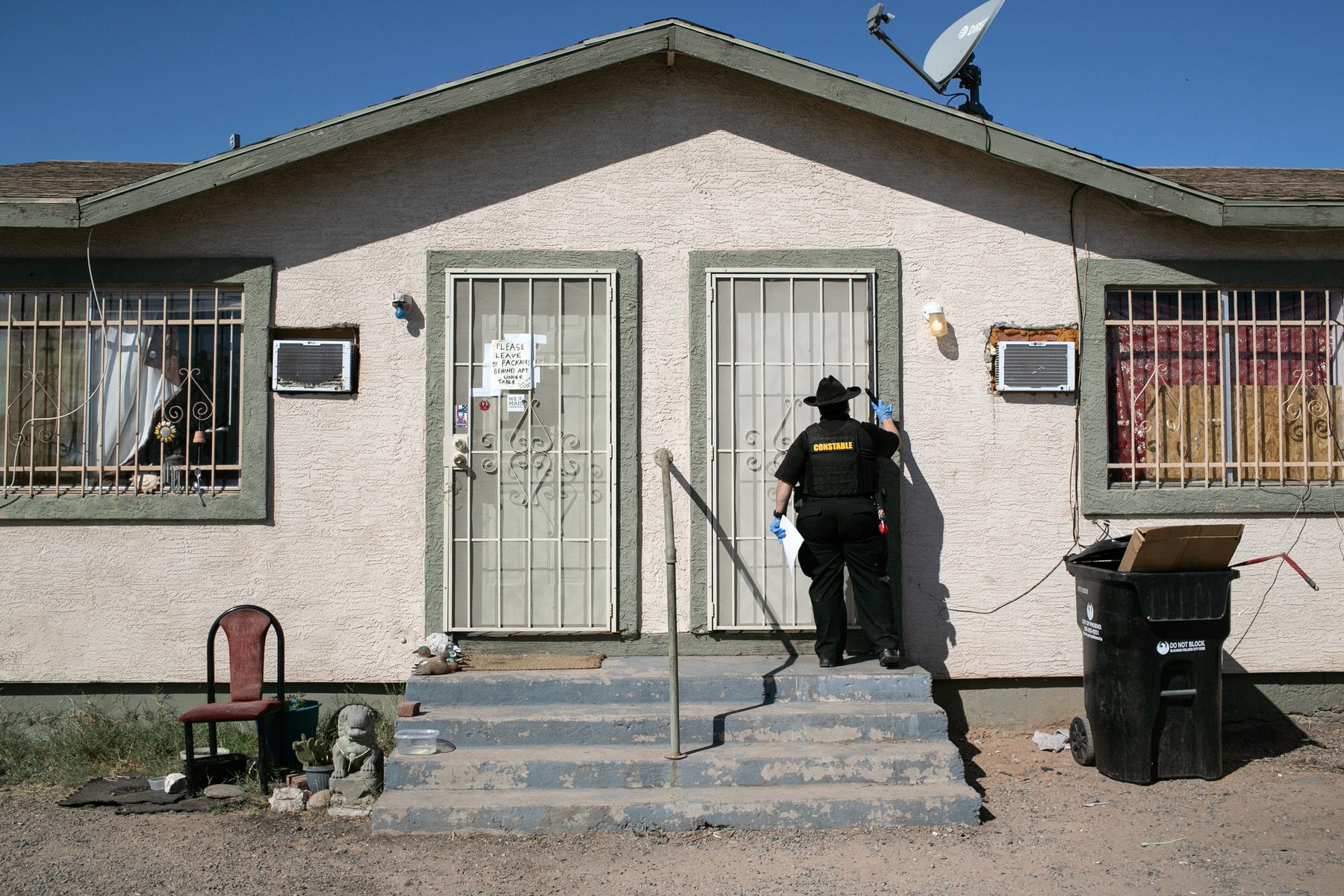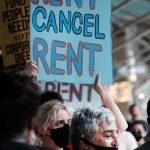A federal eviction moratorium has kept Jesse Tingle in her apartment in Lexington, Kentucky, for nearly a year. But it hasn’t prevented her landlord from sending her to eviction court.
Once a month, Tingle, 30, sits in a packed courtroom as a judge briefly reviews her case. The whole process takes about a minute, according to Tingle. Most times, because of the moratorium, the judge quickly agrees to reschedule her case.
Tingle estimates she has been to eviction court five times this year — each time having to take off work — and she is scheduled to return on August 10. Every time, she leaves court with mixed emotions: relieved that she is able to stay in her apartment, but frustrated over the circumstances that got her to this point.
“A lot of it is the constant stress and being confused about the legal process,” Tingle said. “And they don’t really explain it to you.”
The eviction moratorium, set in place by the Centers for Disease Control and Prevention in September 2020 to stop the spread of COVID-19, is scheduled to expire July 31. But for some people, the threat of losing housing never went away.
Women, particularly women of color, and LGBTQ+ people are among the most susceptible to eviction and housing insecurity. They have faced disproportionate effects of job loss in the pandemic, which could impact their ability to pay for housing. A snapshot of U.S. Census data last fall showed women — in particular Black women and Latinas — were more likely to report not being able to make rent or mortgage payments during the pandemic.
“We read a lot about how women have been kind of forced out of the workforce during COVID, and that’s going to enhance vulnerability to homelessness,” said Marybeth Shinn, a professor of human and organizational development at Vanderbilt University. “Minorities, particularly African Americans and Native Americans, are at much greater risk of homelessness. Even relative to their proportion in poverty. And among young people, LGBTQ young people are at particular risk.”
Tingle’s experience of being summoned to eviction court during the moratorium is not surprising to Kyle Nelson, a doctoral student at UCLA who is studying evictions. Landlords in some jurisdictions around the country have continued to file legal paperwork demanding that their tenants vacate. In some cases, people have been evicted.
“What we call moratoria is actually just a cluster of protections that tenants can use if they go to court,” he said. “And it’s kind of a very sternly worded plea to landlords to not file evictions. But have landlords ever been prevented from filing evictions during COVID? No.”
The U.S. government does not collect eviction data, and county-by-county data can be hard to access. That complicates efforts to gauge a complete picture of eviction proceedings during the pandemic. As of July 24, landlords in six states and 31 cities had filed at least 450,000 evictions during the pandemic, according to data from the Eviction Lab at Princeton University. The group estimates that landlords file 3.7 million eviction cases in a typical year.
It’s unclear how many of these eviction filings have forced someone to leave their home. But it is happening, according to housing experts and tenants’ rights organizers. They point to loopholes in the federal moratorium that have allowed landlords to bring tenants to court over non-payment. Some renters have short leases that may not be covered under the moratorium. Some landlords have claimed that tenants have violated other terms of their leases, breaking the moratorium.
In July, a congressional subcommittee announced it would investigate reports that four corporate housing companies had filed more than 5,000 evictions during the pandemic. During a subsequent hearing this week, at least one group estimated that private equity firms and other corporate housing companies have filed to evict 75,000 residents since the moratorium took effect last September. These filings have disproportionately impacted people of color, particularly Black renters, according to the nonprofit Private Equity Stakeholder Project.
There is even more incomplete data on the number of people who vacate a home because a landlord informally demands it. People sometimes agree to leave because they want to avoid being sent to eviction court, which can become a part of someone’s record and complicate their ability to rent elsewhere.
And all of this is going on with a moratorium in place. Housing experts believe there could be a spike of evictions after July 31. But without complete data and reports of people already being evicted or leaving their homes amid threats of eviction, it’s unclear how large it will be.
“It’s a cliff, but the ground underneath us has been eroding for some time,” said Joan Maya Mazelis, associate professor of sociology at Rutgers University-Camden.
Tingle did not mean to fall behind on her rent. Right when the pandemic began, her job as a teaching assistant at a bootcamp for software engineering was not renewed. Jobs at a dog breeding company and Amazon ended after illnesses tied to chronic health problems flared up. Tingle dipped into savings to pay her rent and other expenses. It wasn’t enough. She has a stack of notices from her apartment complex, which she shared with The 19th, reflecting a growing balance of outstanding rent. It began with $836.44 in August 2020.

That month, Tingle said she was short $60 for her rent. She said she asked someone in the management office of her apartment complex if she could pay the bulk of her rent on time and the remaining balance a few days later. The person at the office said no, according to Tingle.
“We’re in the middle of a pandemic,” Tingle thought to herself.
Shortly after the moratorium was announced in September, Tingle, a queer White woman, alerted the management at her apartment complex about it in writing as she and others had been instructed by the CDC. A few weeks later, on October 8, they sent her a notice to vacate her apartment in 30 days.
“The purpose of this letter is to ask you to LEAVE the premises now,” the document read. She owed $1,857.83 at the time.
At the end of October, Tingle received an email from a building manager.
“Just wanted to update in case you are unaware, evictions are still happening,” the manager wrote. “The constables [sic] office was here today to help with an eviction on property. If you want to avoid a similar fate, rent must be paid.”
But Tingle still couldn’t make the payments. Her outstanding rent ballooned to $5,464.39 by February 2021. Her landlord tacked on fees for the unpaid rent, making a complete payment more out of reach. Tingle claims managers haven’t let her pay portions of her rent, though through court they have agreed to accept over $400.
“I keep accruing a balance because they won’t take my money,” Tingle said.
Tingle’s apartment complex is managed by Monarch Investment and Management Group, a Colorado-based company that manages more than 64,000 apartments in 20 states, according to its website. Geoff Frazier, an attorney for the company, did not comment on the email sent to Tingle, but he challenged her experience with partial payments.
“The allegation that partial payments are not accepted when a resident owes a balance is not accurate as we regularly enter payment plans with residents who owe a balance and are making a good faith attempt to pay,” he wrote in an email to The 19th.
Tingle refutes Monarch’s implication that they have been open to receiving consistent partial rent payments from her. She noted that the CDC moratorium requires that tenants attempt to make timely partial payments, otherwise they risk losing the legal right to use it. Emails reviewed by The 19th from March 2021 show that management at Tingle’s complex were asking for payments of approximately half of her owed balance.
Stephen Marshall, a Kentucky-based attorney representing Monarch against Tingle in eviction court, said in an email that while landlords may choose to accept partial payments, they’re not required to.
“In many instances, accepting a partial payment constitutes a waiver of their ability to proceed with the eviction,” he said, adding that his client has passed up opportunities to obtain eviction judgments for people who had failed to appear in court.
In March, Tingle’s apartment filed a forcible detainer warrant against her, a legal action claiming she refuses to leave her apartment despite not paying to live there. Monarch Investment and Management Group claims Tingle now owes more than $9,000 in rent.
Since the start of the year, Tingle has had a job as a test proctor. But it does not pay enough to clear her debt. She has tried to seek relief, applying for rental assistance through the city of Lexington to help address her balance. She said she was approved, but the process for receiving the money has been slow and confusing.
At a recent eviction court appearance, her attorney recommended that she sign paperwork that would settle her debt with her landlord through the rental assistance she’s been approved for. Tingle said she was confused about the terms of the agreement, but she later signed the document. As of Friday, she has not heard about whether her balance has been paid.
Tingle’s attorney did not immediately return a request for comment.
Tingle doesn’t know what she will do if she still owes rent on Saturday. Will she be physically forced to leave her apartment over the weekend? Will it be up to a judge a few days later in eviction court?
She remembers when she lived in her car a few years ago, which complicated every aspect of her life.
“Once you’re in that situation, it’s hard to get out,” Tingle said. “Where will you shower? How will you eat? Can you store food? Can you hold a job?”
Mazelis from Rutgers called shelter “one of our most fundamental needs” that ties together all other aspects of our lives. That’s especially true as COVID-19 cases are once again surging.
“Without housing — during a pandemic, a lot of people lost their jobs — people out of work have even more difficulty finding a job. They’re more likely to have health issues. They’re more likely to find other difficulties. So it really does have these ripples of consequences.”
Nelson said policymakers need to grapple with the reality that the pandemic is far from over.
“We have to write policy that is taking seriously the idea that, on a micro level, on an individual level and the level of our communities, COVID is not over, and the economic impact of COVID is going to last a long time,” he said.
Nelson said there are ways in which policymakers can better address the country’s growing housing crisis. Those include either directly paying landlords or releasing money more easily to people who need it to pay rent. The rollout of rental assistance has been uneven — as of June, just a small portion of $45 billion in approved funds had been given to renters — preventing the most vulnerable from accessing desperately needed funds. Housing experts say in some cases, the application process has required extensive paperwork that poses barriers to rents. In some cases, landlords have refused to accept the money
Policymakers can also reform laws around evictions, Nelson said, since the system has been designed to play out in courts. That includes providing tenants with counsel. Tingle has a lawyer in eviction proceedings because she found one through free legal services. Most tenants who are being evicted do not have an attorney, while landlords have legal representation about 90 percent of the time.
“There’s no reason why eviction has to happen the way that it happens through the legal system,” he said.
Mazelis said as the moratorium comes to an end, it’s possible more landlords will be willing to wait on evictions as they seek to access rental assistance. The moratorium did not stop landlords from charging rent, meaning many tenants have been accruing thousands of dollars in debt during the pandemic.
“But honestly, it would not surprise me if there was a huge spike in evictions next week and a huge spike in homelessness,” she said.
Frazier, one of the attorneys for Tingle’s apartment complex, said they hope to receive rental assistance funds on behalf of Tingle “as early as next week.” He said the complex has worked with local rental assistance organizations “to get dozens of residents rental assistance funds and waives any late fees or other fees when doing so.”
Tingle feels in limbo. Even if her rental assistance comes through as expected, she can no longer afford to live in her apartment complex. She needs to find new housing, but now she worries about the eviction proceedings on her record.
Tingle wonders how the system in place helps anyone, not just tenants but landlords, too.
“They’re going to have all these apartments vacant, how does that serve anyone?” she said.







